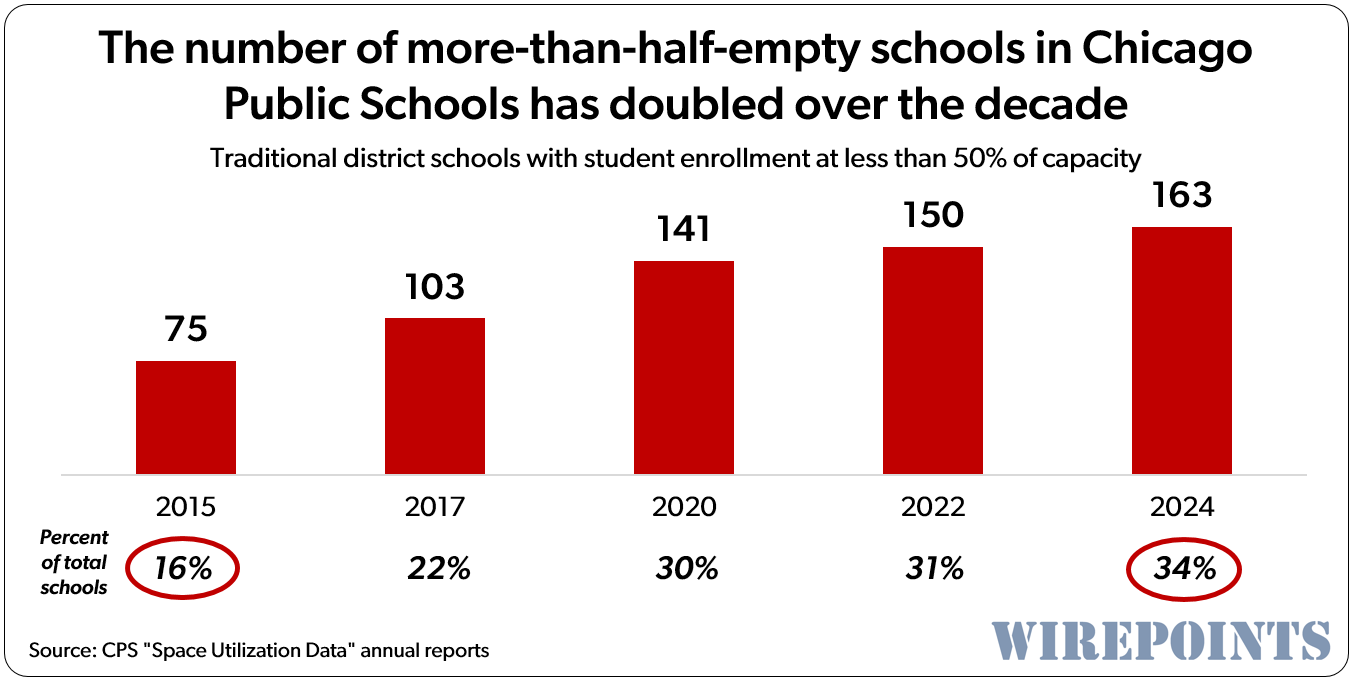Press Release: Overpromised benefits, not underfunding, have been the real cause of Illinois’ pension crisis
Wirepoints’ new report shows how overpromised and overgenerous benefits have created Illinois’ worst-in-nation crisis.
A Wirepoints’ analysis of official state data finds that total pension promises owed to state workers, teachers, university employees, judges and lawmakers have exploded over the past three decades. Those promises – known as accrued liabilities – have grown 1,146 percent since 1987, four times more than both Illinois’ economy and the state’s general revenues. Promises have overwhelmed the ability of ordinary Illinoisans to pay for them.
A 50-state comparison over a shorter time frame shows Illinois’ total pension promises grew the 5th-fastest nationally between 2003 and 2017. Illinois’ total benefits grew more than twice as fast as Wisconsin’s over that time period.
Wirepoints also calculated that if Illinois’ pension benefit growth had only been more moderate over the past three decades – i.e., at the national average – the state wouldn’t be in the crisis it’s in.
“Illinois’ pension crisis is usually blamed on ‘underfunding,’” says Ted Dabrowski, President of Wirepoints. “That implies Illinoisans failed to pay enough into pensions and gives lawmakers the excuse to hike taxes. But underfunding isn’t the problem. The true cause of Illinois’ crisis has been the dramatic overpromising of benefits.”
That’s the key finding in “Illinois Pensions: Overpromised & Overgenerous,” part two of Wirepoints’ new Special Report: “Solving Illinois’ Pension Problem: Why It’s Legal, Why It’s Necessary, and What it Looks Like.”
Today’s release includes a 50-state analysis of state-level pension benefit growth and a survey of teacher pension benefits and state worker retiree health insurance benefits in Illinois and ten other peer states.
The following are some of the facts included in Wirepoints’ report:
- Total pension promises made by the state’s five state-run pension funds have grown 1,146 percent since 1987, according to Wirepoints’ analysis of Illinois Department of Insurance data. That’s four times more than both Illinois’ economy and the state’s general revenues over the same time period.
- Illinois is an outlier in pension growth compared to other states. Wirepoints’ breakdown of Pew Charitable Trusts data shows Illinois’ pension promises grew the 5th-fastest nationally between 2003 and 2017, at a yearly clip of 7.2 percent. Neighboring Indiana’s growth was 4.7 percent and Wisconsin’s was 3.5 percent, by comparison.
- Illinois government workers receive some of the nation’s most generous retirement benefits. Career teachers retiring today, for example, can expect to retire in their 50s, get automatic COLAs, and end up with an average of $2.9 million in lifetime pension benefits.
- Teachers in the nation’s other big states get far less benefits. California, New York, Florida, Texas and Pennsylvania grant lifetime benefits ranging from $2.4 million in New York to just $1.3 million in Texas, according to a Wirepoints analysis of state FOIA and actuarial data.
- Teachers in Illinois’ neighboring states don’t receive such generous benefits either. Total benefits range from $2.1 million in Kentucky to $1.5 million in Indiana.
- Illinois retirees get automatic 3 percent, compounded COLAs every year. In contrast, New York retirees receive a simple 1 to 3 percent increase, but only on their first $18,000 in benefits. Texas retirees got their first COLA increase in over a decade in 2019. And in Pennsylvania, teachers haven’t gotten a COLA increase since 2002. In Iowa, COLAs are not offered.
- Illinois offers state workers free health insurance in retirement after just 20 years of service, a benefit worth $200,000 to $500,000 per retiree. None of Illinois’ peer states offer as generous a benefit. Nationally, state workers on average pay for half the cost of their retiree health insurance.
“Illinois’ decades of overpromising and politicians’ refusal to acknowledge the state’s growing problems have created the worst pension crisis in the nation,” says Wirepoints Executive Editor and Founder Mark Glennon. “But there is a path to reform. Illinoisans can amend the state constitution’s pension protection clause and enact the statutory reforms Illinois needs.”
Read “Part 2: Illinois Pensions – Overpromised & Overgenerous” at: https://wirepoints.org/part-2-illinois-pensions-overpromised-overgenerous/
Wirepoints’ full report: “Solving Illinois’ Pension Problem,” is being released in four parts over four weeks:
- Part 1: Illinois is the Nation’s Extreme Outlier
- Part 2: Illinois Pensions: Overpromised & Overgenerous
- Part 3: Why Pension Reform is Legal
- Part 4: A Solution for Illinois’ State Retirement Crisis
###
Wirepoints is an independent, not-for-profit organization dedicated to connecting the dots between our economy, government and people. Based in the Chicago metro area, the Wirepoints team provides original research and commentary about Illinois’ economy and government. Its research has been cited by The Wall Street Journal, New York Times, Forbes, Barron’s, Crain’s Chicago Business, and the Chicago Tribune, among others. Find more of Wirepoints’ original analysis and commentary at wirepoints.org.

 A set of state lawmakers want to extend CPS’ current school closing moratorium to February 1, 2027 – the same year CPS is set to transition to a fully-elected school board. That means schools like Manley High School, with capacity for more than 1,000 students but enrollment of just 78, can’t be closed for anther three years. The school spends $45,000 per student, but just 2.4% of students read at grade level.
A set of state lawmakers want to extend CPS’ current school closing moratorium to February 1, 2027 – the same year CPS is set to transition to a fully-elected school board. That means schools like Manley High School, with capacity for more than 1,000 students but enrollment of just 78, can’t be closed for anther three years. The school spends $45,000 per student, but just 2.4% of students read at grade level.
 Hopefully, all media will get the message, in Illinois, too.
Hopefully, all media will get the message, in Illinois, too. Ted joined Tom Miller of WJPF to talk about Illinois’ highest-in-the-nation property taxes, why lawmakers don’t want to touch the tax’s cost drivers, just how much Illinoisans’ tax burden has grown over the decades, why Gov. Pritzker failed to meet his promise to reform property taxes, and more.
Ted joined Tom Miller of WJPF to talk about Illinois’ highest-in-the-nation property taxes, why lawmakers don’t want to touch the tax’s cost drivers, just how much Illinoisans’ tax burden has grown over the decades, why Gov. Pritzker failed to meet his promise to reform property taxes, and more.
Raise Taxes. There is no reason Illinois income tax rate should not be 15%.
It costs lots of money to retire at age 45 to Florida and live in a luxury home, drive a luxury car and have a nice boar.
If you do not like it MOVE.
Illinois ” Land of Slavery”.
Can’t do Pension Reform, then do Salary Reform, 10% cut in pay to fund pensions.
And Pritzker’s and Madigan’s excuses for this taxpayer funded public employee largesse!?